Before we get to today's review, it feels only right to first mention 1993's The Incredible Machine, which was my first foray into what I'd call "Zen" gaming (I'm not out to coin any new phrases here – just trying to accurately describe the genre).
While TIM had a point (solving increasingly more complex puzzles using interconnected appliances), it also had a magnificent sandbox mode, where you could cobble your own contraptions together out of fans, conveyor belts, light switches, tennis balls, flashlights and what-have-you. It was so engrossing and so much fun that – for the longest time – I didn't even realize the game had an actual scripted section as well: instead, I spent days building improbable looking aircraft, mouse-propelled submarines, cat ejection seats and whatever else happened to strike my fancy at the moment...
None of it served a purpose. I wasn't scoring points, completing objectives or progressing within a narrative. I was just doing things to be doing them: existing in the moment, as it were...
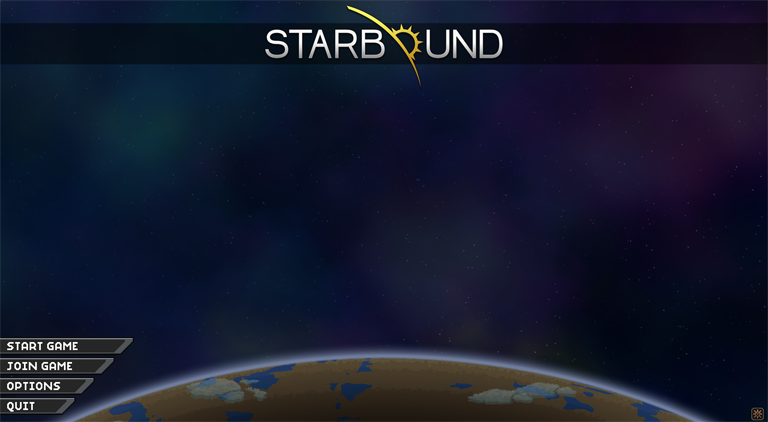
And while Starbound does have a plot, it also contains all the best, Zen-like qualities of The Incredible Machine.
In Starbound, you play a freshly-minted member of the Terrene Protectorate: an interspecies coalition sworn to protect the galaxy from wrongdoing. You wake up on the day of your official promotion into the ranks only to have it Upend In A Spectacular Fashion and are then thrust into a system-spanning quest to defeat an arch-baddie called The Ruin. It's not overly original or complex, as plots go, but it is gracefully put together and solidly written (with moments of genuine hilarity).
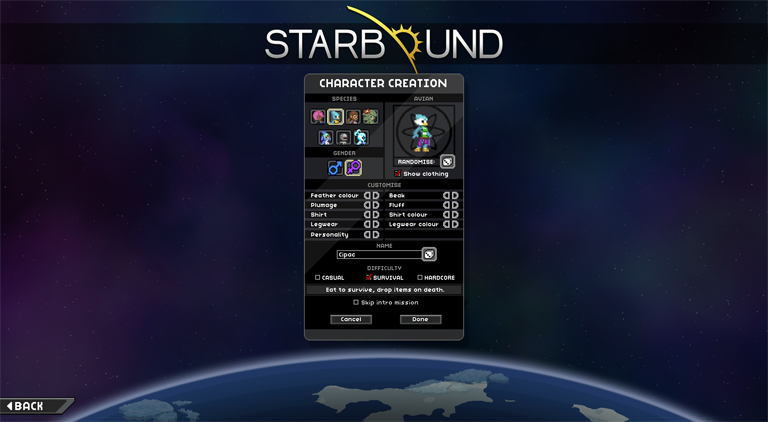
Your character can belong to one of the Protectorate's seven races:
- 1) Human – your run-of-the-mill, spacefaring Homo sapiens;
- 2) Apex – militaristic apes caught halfway between Glasnost and an actual Big Brother;
- 3) Avian – mystical birds with a propensity for Egyptology and airships;
- 4) Floran – plant-based carnivores (!) who'd give a Predator a run for his money;
- 5) Hylotl – three-eyed, technologically advanced sea dwellers;
- 6) Piglett – hyper-advanced space-pigs who employ feudal robots for labor; and
- 7) Novakid – gaseous frontiers-folk who look like balloons doing cowboy cosplay;
The races don't really differ in any way (none of them have any unique powers or abilities, which I think is a missed opportunity), other than visually and by the type of items they can craft. The characters also do not really have statistics: rather, every character – regardless of race – gets the same, base life and energy, which is then multiplied by bonuses from your equipment. The resultant math dictates how much punishment you can take, how hard-hitting your attacks will be and what atmosphere you can put up with.
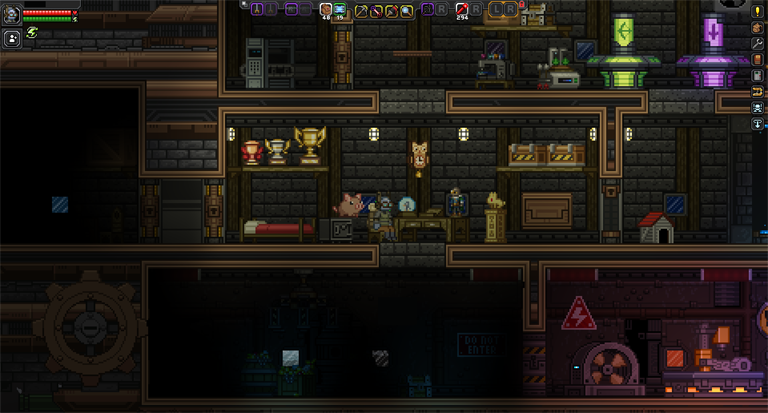
What each race does get, however, is — a pet! Humans hang out with cats, the Apex have weasels, Avians dig bunnies, Florans get snakes, Hylotl "cuddle" three-eyed crabs called Crasberries; Pigletts adore their Glitch servants and Novakids get fluffy little nimbus-critters called Snuggets. Each race also gets its own, distinct (and upgradeable) space ship – which is where your pets hang out during the game.
As befits a Zen game, the pets don't really do anything (although there is another class of pet you can capture, Pokemon-style, and use in combat); but you can pet them, for which you are always rewarded with a big dose unconditional Wuv.
The game is divided into three modes:
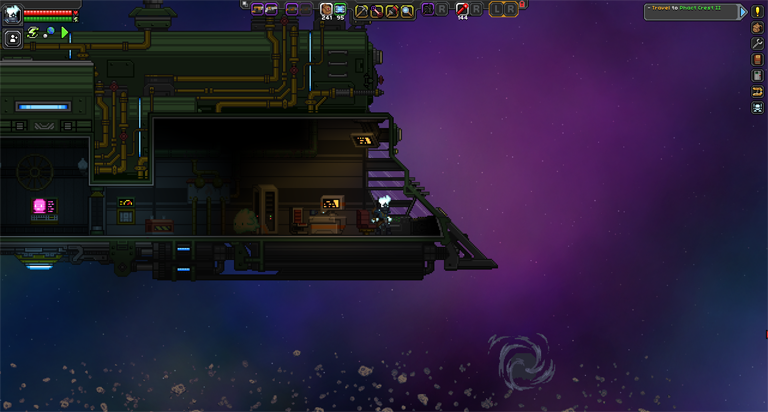
- 1) Your ship – which you can expand, re-decorate, stuff full of shiny things and use to get around a procedurally-generated galaxy (with incrementally more difficult planets);
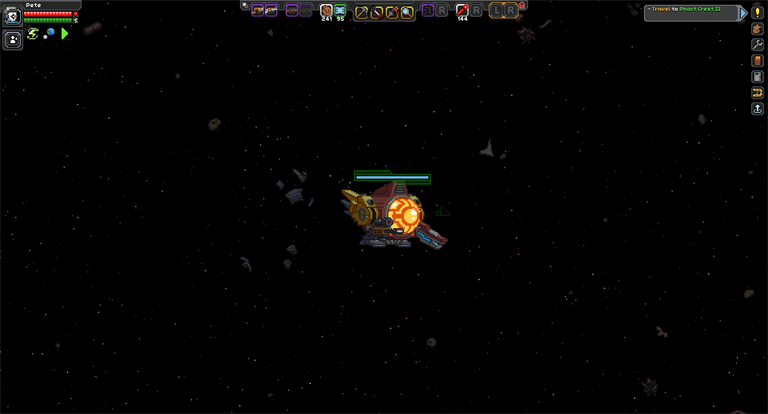
- 2) Your Mech – which you can beam down to a planet or use to fly around in space, in a side-scrolling shooter with proper newtonian physics; and
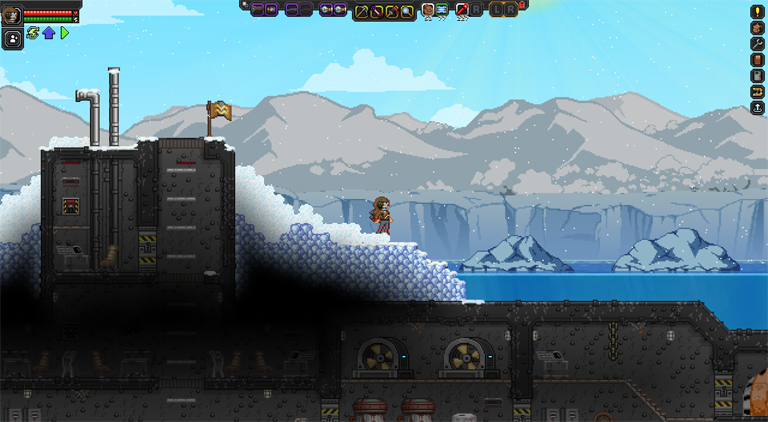
- 3) Walkabout – which makes up the majority of game-time and consists of exploring planets, space-stations and ships, completing plot missions, or engaging in one of the game's myriad Zen activities;
Since, in a compelling one-two, the game pairs sandbox-y freedom with tons of Zen-doings to engage in, there is no real pressure to complete the plot (or undertake it altogether). You could sideline doing missions at any point and go do whatever you like for as long as it suits you.
My main character (an upstanding member of Piglett nobility with his faithful Glitch servant) runs an underwater restaurant, called The Aquarium, and is a chef of no small renown (having had mastered every recipe in the game); while simultaneously being landlord to a some very unfortunate tenants who occupy Fallout Flats: an apartment block on a lethal, toxic world. Another has a penchant for repurposing war ruins (which, technically, she first builds rather than finds; to date, she's "found" an abandoned submarine stuck in an iceberg and a missile silo turned into an underground garden); while a third has a part of his ship converted into pasture for milk cows and has a giant, fluffy tree in the middle of his den...
As activities go, you could also plant a garden, go fishing, collect bugs or excavate fossils; learn cooking recipes, capture rare pets, hunt down action figures, or – you know – erect a fully-functioning sky scraper, have tenants and collect rent (as you do).
Completing some activities is free (like cooking, where it's enough to find ingredients and a fire to get started), while others require specialized tools (like – say – a fishing rod) which is where crafting comes into play.
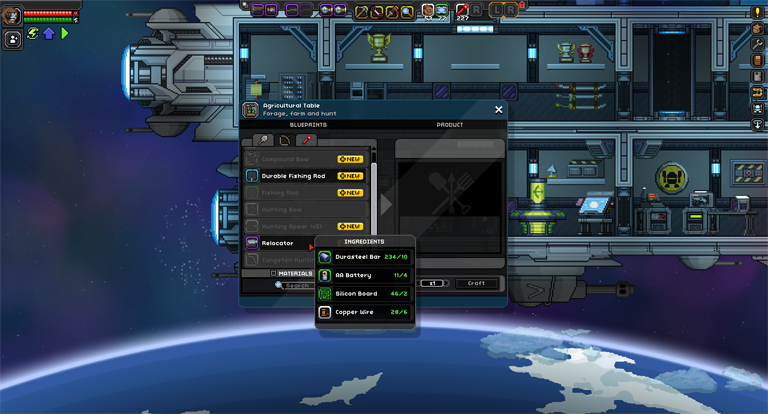
Starbound's crafting system is an extensive and engrossing beast, which lets you assemble armor, weapons, gardening tools, "wiring" (algorithm-driven switches that can affect other game elements), smelt minerals, build building blocks or tiles and construct new 'Mech parts. It has several tiers of advancement, which require increasingly rare minerals and make for a fun experience that will keep you traveling to more dangerous worlds to keep up with the demands of tier progression (not that you have to – but the best equipment requires minerals you can only find in the toughest environments).
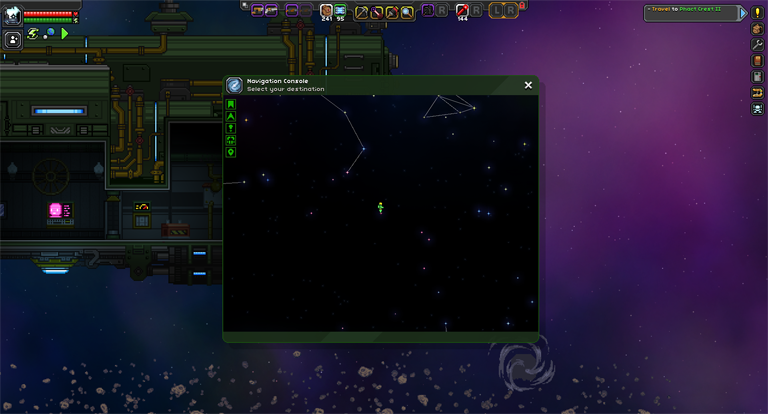
The galaxy is procedurally generated, with – I'm gonna say – oodles of systems, each of which has a random amount and type of planets (though certain kinds of biomes appear only in certain kinds of systems). Traveling between systems in your ship is accomplished with the use of Erchius Fuel (a pink liquid only found on moons, the extraction of which is – shall we say – tense and more than a little bit creepy). Any place you mark (with a flag or teleporter) you can double back to later, while plot missions can be accessed at any time from your ship's computer. There is also a hub (with stores and activities) called the Outpost that you can access from anywhere in the galaxy.
On top of everything else, Starbound's 1.4 patch also added the "Becoming a Peacekeeper" quest, which comes with new Peacekeeper (basically space police) stations, bounty boards with procedurally generated quests and a quest line leading to a confrontation with one of the game's antagonists. It's a cherry on top of another, larger cherry atop a cake with enough layers to keep you munching for a good, long while.
But if you still need more of a reason to play – if traveling to distant worlds isn't enough, the prospect of constructing your own space station bores you, and boring to the core of a planet seems (what's the word...) tedious – the solution is simple: Do It All With a Friend! Because, content-packed as it is, Starbound also comes stock with LAN co-op multiplayer. Bam!
If you want a good-looking game with pleasant music, good writing and no set ending that can cater to different moods and offer many distractions (in space!), Starbound might just be what you are looking for. Equal parts shooter, platformer, builder, sandbox and Zen, it's one of those games that you may never uninstall, because an idea for making something new is always just around the corner (in my case, I still want to make an abandoned aircraft in a planet's stratosphere, a ruined, gigantic tank in a desert and – a ranch-in-a-bottle on a barren, airless world).
If you do end up playing and are ever in the vicinity of Girtab Wake IV, drop in for lunch: chef Piglett makes a really good Stuffed Dirturchin and his Zmash is to die for (literally — unless you're a Glitch).
Pig Recommends:
- -if you enjoy building games and problem solving, try Simple Planes; it's not quite as forgiving as Starbound (because, you know – physics), but adapting your idea for an aircraft to What Actually Works can be challenging fun (my proudest moment to date has been recreating Porco's Savoia S.21 which actually flies! ... not well, but — still);
